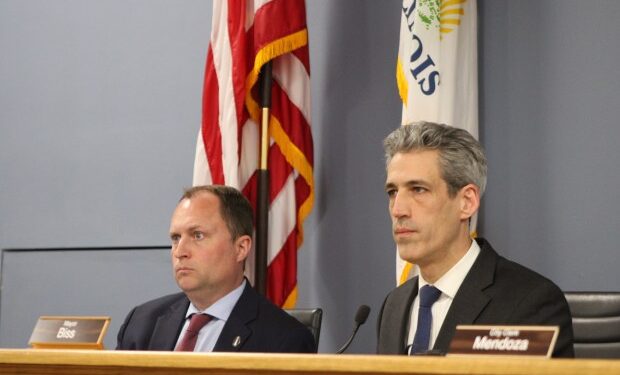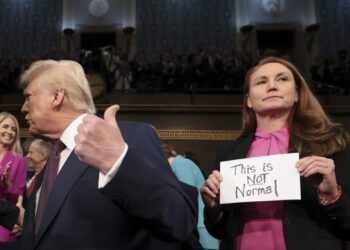The city of Evanston has announced it is taking measures to protect immigrants from the potential deportation initiative that incoming President Donald Trump has said will take place as soon as his first day in office. Meanwhile, officials in Skokie and Glenview, other North Shore towns with significant immigrant populations, have said they’ll take a wait-and-see attitude.
Evanston’s City Council unanimously voted at its Jan. 13 meeting to approve changes to its existing Welcoming City ordinance. The amendments redefine key terms of the ordinance, which would prohibit Evanston authorities from assisting immigration officers other than U.S. Immigration and Customs Enforcement agents, as some groups have expressed worry that Trump could invoke the military to carry out deportations.
Fred Tsao, the senior policy director for the Illinois Coalition of Immigrant and Refugee Rights, said Evanston’s ordinance surpasses protections offered by the city of Chicago and the state of Illinois. “We believe passing these amendments is a very crucial step, especially in light of the incoming federal administration,” he said.
During his presidential campaign, Trump said that if re-elected, he would explore options of invoking the National Guard and the military domestically to deport millions of migrants, according to the Associated Press.
Tsao said the redefined terms of Immigration Officer and Immigration Detainer could be applied to the National Guard and the military and that Evanston authorities would be prohibited from cooperating with them.
Tsao said the ordinance doesn’t mean immigrants cannot be deported if they are in Evanston, noting that’s a common misconception that some people have about sanctuary cities and states. “ICE can still do what it does here (Evanston). It just means that they won’t get help from the city,” he said.
Evanston originally passed a Welcoming City ordinance in 2016, along with Chicago and Illinois. Trump threatened to withhold federal funding from sanctuary cities, but a panel of federal judges ruled the government could not withhold those funds.
“So, we have excellent precedent and sound constitutional arguments on our side,” said the city’s Chief Legislative Policy Advisor Liza Roberson-Young.
“The attempt to withhold the funding was unconstitutional because the federal government can’t conscript the police power of states or local governments to achieve its policy goals,” Roberson-Young said.

Nadav Shoked, an expert in local government and legal history at the Northwestern University Pritzker School of Law, told Pioneer Press that Evanston’s updated ordinance is “mostly symbolic,” as Evanston is not a likely target for the federal government, in part due to the federal government’s limits.
“The underlying problem that the federal government will always have is that it really doesn’t have a police force,” Shoked said. “So if you’re the federal government, you kind of have to rely on the goodwill of state and local forces to help you, and it’s almost all local in America, including in Illinois.”
“If you have a limited force, you go for the easy targets,” he said, referring to encampments and shelters in Chicago which aren’t housing as many people as they used to.
Shoked said an unintentional consequence of the ordinance could be putting federal funds in jeopardy, as happened during Trump’s first term.
“Last time, they (the Trump administration) were exceptionally ineffective… Now, I think they have a better idea of what they can legally do,” Shoked said.
Evanston is also scheduled to host a free Know-Your-Rights workshop on Jan. 20 at 6 p.m. at the Lorraine H. Morton Civic Center, 2100 Ridge Ave., Evanston, to educate residents on how to recognize profiling, discrimination, exploitation, mistreatment or abuse.
‘Wait and see’
Other municipalities on the North Shore area are opting to see what the Trump administration will do in its second term.
“We’re basically taking a wait-and-see attitude,” Skokie Mayor George Van Dusen said. “It’s very hard to know what the administration might do or perhaps will not do.”
Van Dusen said it wouldn’t be likely that the military would be used to carry out deportations, as it would likely be unconstitutional, he said.
Shoked also said the use of the military for domestic purposes could raise constitutional issues.
In 2017, the Skokie Village Board adopted changes to its Human Relations Code that in many ways mirrored what other villages and cities call a Sanctuary City or Welcoming City ordinance, according to the village’s corporation counsel.

Patrick Gorski / Pioneer Press
Organizers of the Jan. 29, 2017, anti-Trump immigration policy rally held at the Muslim Education Center in Morton Grove also encouraged towns to adopt sanctuary ordinances. Some Skokie residents are pushing for that village to establish a sanctuary policy.
The timing of the adopted changes was two months into Trump’s first term. It was also after a local group urged the village board to adopt a Sanctuary Village ordinance.
When asked if the village’s corporation counsel and legal department are reviewing the Human Relations Code again, Van Dusen said, “No. Not at this time.”
The village of Glenview is not planning to pass a Welcoming City ordinance, or anything similar, ahead of Trump’s second term, according to the village’s Director of Communications and Community Engagement David Just. Just noted that the state of Illinois contains protections in its Illinois TRUST Act.
The act denies local law enforcement the ability to detain people on behalf of immigration officials, and bars local officials from asking about a person’s immigration status, among other protections.







